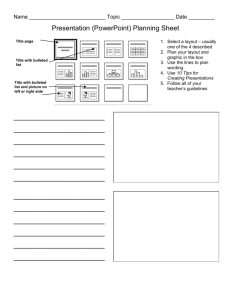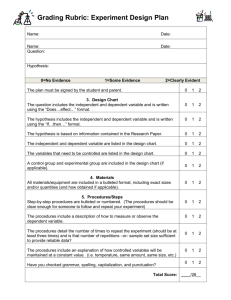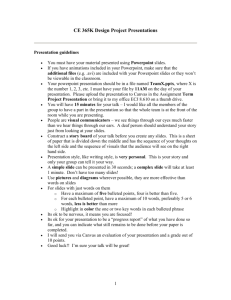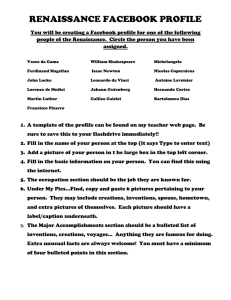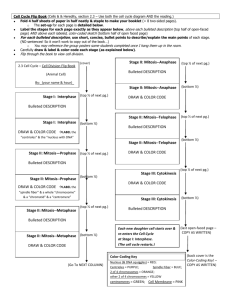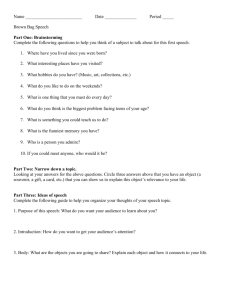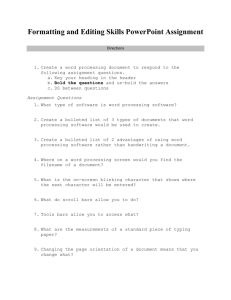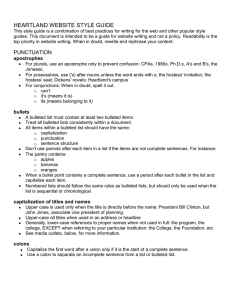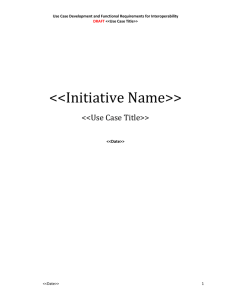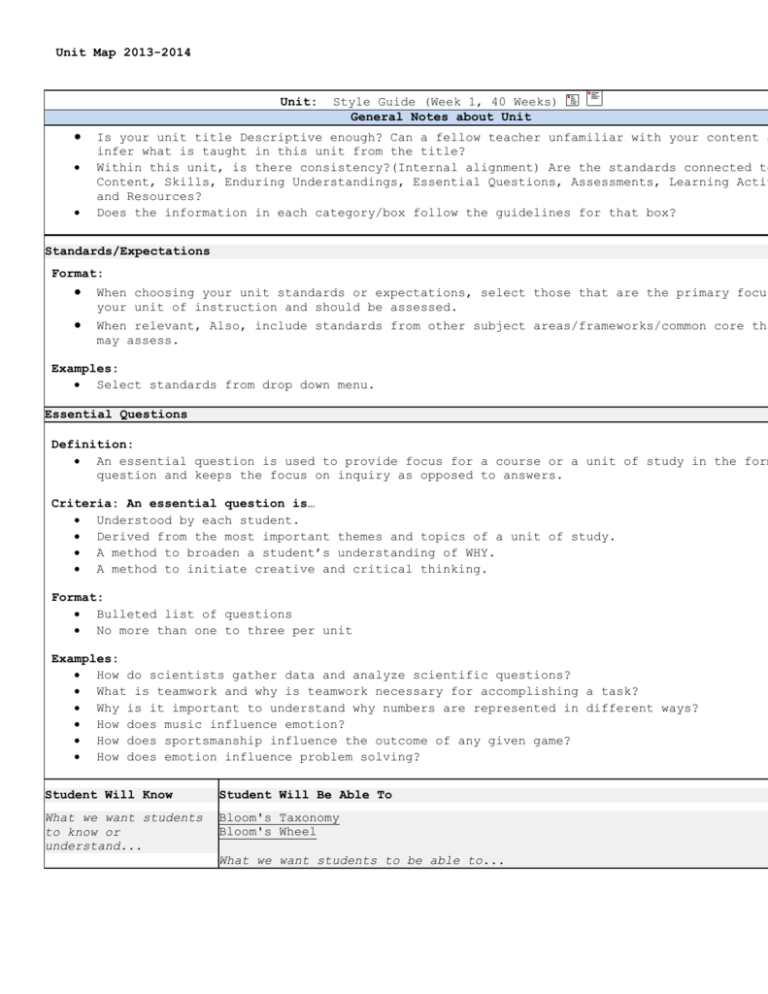
Unit Map 2013-2014
Unit:
Style Guide (Week 1, 40 Weeks)
General Notes about Unit
Is your unit title Descriptive enough? Can a fellow teacher unfamiliar with your content a
infer what is taught in this unit from the title?
Within this unit, is there consistency?(Internal alignment) Are the standards connected to
Content, Skills, Enduring Understandings, Essential Questions, Assessments, Learning Activ
and Resources?
Does the information in each category/box follow the guidelines for that box?
Standards/Expectations
Format:
When choosing your unit standards or expectations, select those that are the primary focus
your unit of instruction and should be assessed.
When relevant, Also, include standards from other subject areas/frameworks/common core tha
may assess.
Examples:
Select standards from drop down menu.
Essential Questions
Definition:
An essential question is used to provide focus for a course or a unit of study in the form
question and keeps the focus on inquiry as opposed to answers.
Criteria: An essential question is…
Understood by each student.
Derived from the most important themes and topics of a unit of study.
A method to broaden a student’s understanding of WHY.
A method to initiate creative and critical thinking.
Format:
Bulleted list of questions
No more than one to three per unit
Examples:
How do scientists gather data and analyze scientific questions?
What is teamwork and why is teamwork necessary for accomplishing a task?
Why is it important to understand why numbers are represented in different ways?
How does music influence emotion?
How does sportsmanship influence the outcome of any given game?
How does emotion influence problem solving?
Student Will Know
Student Will Be Able To
What we want students
to know or
understand...
Bloom's Taxonomy
Bloom's Wheel
What we want students to be able to...
Definition:
What students
should KNOW and
UNDERSTAND
Should be what
you are
teaching (not
what students
are doing).
Should relate
to the
essential
questions
Should list
specific
information,
related
vocabulary,
procedures,
facts.
Definition:
Students should be ABLE TO DO.
Should be what students are doing (not what you are teaching)
Should be achievable and measurable. Avoid using "understand," "kno
anything else that is not measurable. If using "demonstrate," make
you also include more specifically
Format:
Bulleted list of phrases.
Begin with a verb using Bloom’s Taxonomy if possible.
BOLD the verb
Examples:
Research and analyze past periods, events, and issues, using a vari
primary sources
Format:
Finish the
sentence “We
want students
to know or
understand…”
Bulleted list
of phrases.
Examples:
Scientific
method
Metric system
French and
Indian War
Parts of speech
Short vowels
Place value to
the millions
Point of view
Academic Vocabulary
Definition:
New vocabulary terms introduced in this unit.
Format:
Bulleted list of vocabulary terms
Examples:
Base 10 blocks
Compare / Contrast
Assessment
Definition: the formative activities and assessments
Criteria: Formative Assessment is…
most effective when it reflects an understanding of learning as multidimensional, integrate
revealed in performance over time.
works best when it is ongoing.
used to assist student learning.
identifies strengths and weaknesses.
used to assess and improve teaching effectiveness.
Format:
using the drop down menu –
Name: give a descriptive TITLE: statement of connection to skill/objective
Method: choose from drop down items
Core Curriculum: check all standards that apply
Examples:
Story Sequencing
Performance: Authentic Task
Students will sequence events from a story by cutting and gluing down the pictures in the o
they occurred in the story.
Summer reading assignment
Written: Journal/ Diary
Homework
Definition: the summative assessments
Criteria: Assessment is…
most effective when it reflects an understanding of learning as multidimensional, integrate
revealed in performance over time.
works best when it is ongoing.
used to evaluate student learning.
identifies strengths and weaknesses.
used to assess and improve teaching effectiveness.
Criteria: Summative Assessment is…
usually given at the end of a unit, chapter, quarter, semester.
used to evaluate learning and instruction.
Format:
using the drop down menu –
Name: give a TITLE that relates to the unit of study
Method: choose from drop down items
Core Curriculum: check all standards (frameworks/common core) that apply
Examples:
Construction Vocabulary
Summative: Oral skill demonstration during class discussion
The class will collaborate to make a construction vocabulary poster. Students will share
construction words, tools, and machines that they have learned this month. The teacher will
the children's responses on chart paper to create a class poster.
Place Value Test: Chapter 1
Summative: Test: Written
Learning Activities
Resources & Tech Integration
Definition:
List all
activities used
Definition:
materials,(all manipulates), used in instruction
to instruct this
unit
Format:
What students are
bulleted list of resources
asked to do in
order to learn
Examples:
Methods you use
Monomers:
to help students
learn
http://www.phschool.com/science/biology_place/biocoach/bioprop/mono
Describe how each
Text: History Alive! The Medieval World and Beyond, TCI 2005
activity is being
Using Pictures to Analyze the Boston Massacre
used
Place
Value Manipulatives
Include
Oral
Language
cards
supporting
Compound
microscope,
graphing calculators
attachments such
as sample lesson
plans, weekly
assignment
sheets, unit
calendars and
syllabi.
Format:
Bulleted list of
Activities
Description of
each activity
Examples:
Guides for
reading
Guides for
reading: I
distributed a
guide for reading
document with
questions about
the chapter (see
attached).
Differentiated
Instruction
Definition:
Modifications,
accommodations
used for
different
learners.
Format:
Select from dropdown or input
your own
strategy.
Teacher Reflection Notes
Definition:
Ideas for revisions and modification for future unit development.
Format:
Bulleted list of key ideas.
Include dates reflection was made.
Examples:
10/16/2013: This unit could be shorter…
8/24/2013: The lesson today was too hard and needs to be broken up
Examples:
© Rubicon International 2013. All rights reserved

